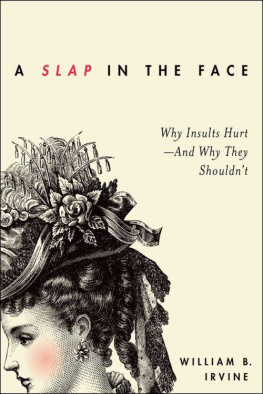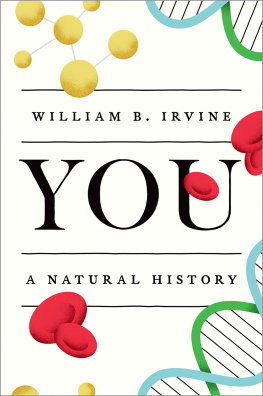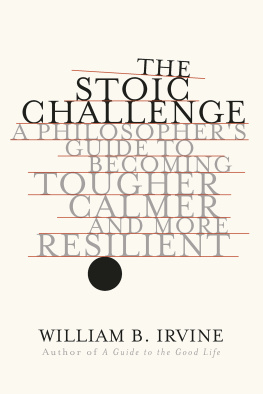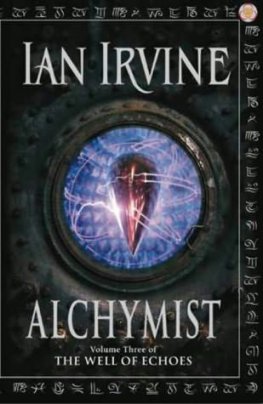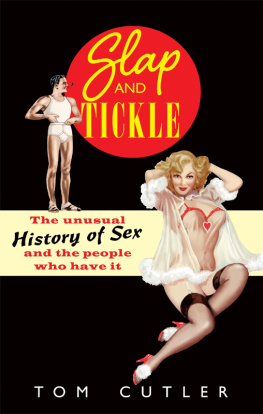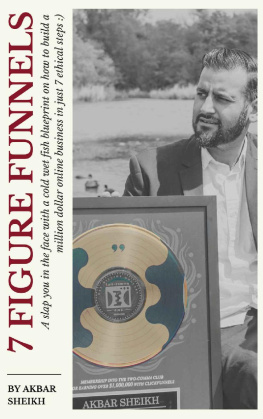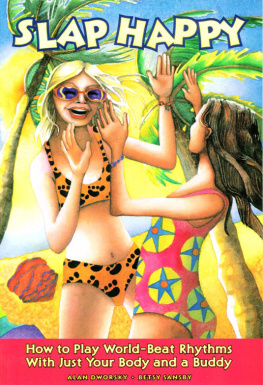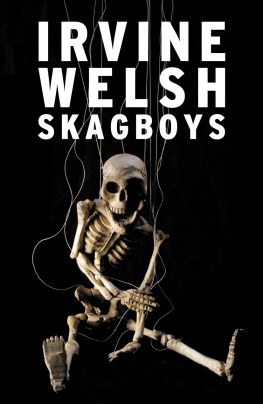William B. Irvine - A Slap in the Face: Why Insults Hurt--And Why They Shouldnt
Here you can read online William B. Irvine - A Slap in the Face: Why Insults Hurt--And Why They Shouldnt full text of the book (entire story) in english for free. Download pdf and epub, get meaning, cover and reviews about this ebook. year: 2013, publisher: Oxford University Press, genre: Romance novel. Description of the work, (preface) as well as reviews are available. Best literature library LitArk.com created for fans of good reading and offers a wide selection of genres:
Romance novel
Science fiction
Adventure
Detective
Science
History
Home and family
Prose
Art
Politics
Computer
Non-fiction
Religion
Business
Children
Humor
Choose a favorite category and find really read worthwhile books. Enjoy immersion in the world of imagination, feel the emotions of the characters or learn something new for yourself, make an fascinating discovery.
- Book:A Slap in the Face: Why Insults Hurt--And Why They Shouldnt
- Author:
- Publisher:Oxford University Press
- Genre:
- Year:2013
- Rating:5 / 5
- Favourites:Add to favourites
- Your mark:
- 100
- 1
- 2
- 3
- 4
- 5
A Slap in the Face: Why Insults Hurt--And Why They Shouldnt: summary, description and annotation
We offer to read an annotation, description, summary or preface (depends on what the author of the book "A Slap in the Face: Why Insults Hurt--And Why They Shouldnt" wrote himself). If you haven't found the necessary information about the book — write in the comments, we will try to find it.
A Slap in the Face: Why Insults Hurt--And Why They Shouldnt — read online for free the complete book (whole text) full work
Below is the text of the book, divided by pages. System saving the place of the last page read, allows you to conveniently read the book "A Slap in the Face: Why Insults Hurt--And Why They Shouldnt" online for free, without having to search again every time where you left off. Put a bookmark, and you can go to the page where you finished reading at any time.
Font size:
Interval:
Bookmark:
| William B. Irvine - A Slap in the Face: Why Insults Hurt | |
| William B. Irvine | |
| Oxford University Press (2013) | |
| Tags: | Language Arts, Philosophy, Psychology Language Artsttt Philosophyttt Psychologyttt |
William Irvine undertakes a wide-ranging investigation of insults, their history, the role they play in social relationships, and the science behind them. He examines not just memorable zingers, such as Elizabeth Bowen's description of Aldous Huxley as "The stupid person's idea of a clever person," but subtle insults as well, such as when someone insults us by reporting the insulting things others have said about us: "I never read bad reviews about myself," wrote entertainer Oscar Levant, "because my best friends invariably tell me about them."
Irvine also considers the role insults play in our society: they can be used to cement relations, as when a woman playfully teases her husband, or to enforce a social hierarchy, as when a boss publicly berates an employee.
He goes on to investigate the many ways society has tried to deal with insultsby adopting codes of politeness, for example, and outlawing hate speechbut concludes that the best way to deal with insults is to immunize ourselves against them: We need to transform ourselves in the manner recommended by Stoic philosophers. We should, more precisely, become insult pacifists, trying hard not to insult others and laughing off their attempts to insult us.
Why Insults HurtAnd Why They Shouldnt
William B. Irvine


Oxford University Press is a department of the
University of Oxford. It furthers the Universitys objective
of excellence in research, scholarship, and education
by publishing worldwide
Oxford New York
Auckland Cape Town Dar es Salaam Hong Kong Karachi
Kuala Lumpur Madrid Melbourne Mexico City Nairobi
New Delhi Shanghai Taipei Toronto
With offices in
Argentina Austria Brazil Chile Czech Republic France Greece
Guatemala Hungary Italy Japan Poland Portugal Singapore
South Korea Switzerland Thailand Turkey Ukraine Vietnam
Oxford is a registered trade mark of Oxford University Press
in the UK and certain other countries
Published in the United States of America by
Oxford University Press
198 Madison Avenue, New York, NY 10016
William B. Irvine 2013
All rights reserved. No part of this publication may be reproduced,
stored in a retrieval system, or transmitted, in any form or by any means,
without the prior permission in writing of Oxford University Press,
or as expressly permitted by law, by license, or under terms agreed with
the appropriate reproduction rights organization. Inquiries concerning
reproduction outside the scope of the above should be sent to the
Rights Department, Oxford University Press, at the address above.
You must not circulate this work in any other form
and you must impose this same condition on any acquirer.
Library of Congress Cataloging-in-Publication Data
Irvine, William Braxton, 1952
A slap in the face : why insults hurtand
why they shouldnt / William B. Irvine.
p. cm.
Includes bibliographical references.
ISBN 978-0-19-993445-4 (alk. paper)ISBN 978-0-19-993446-1 (updf)
1. Resilience (Personality trait) 2. Invective. I. Title.
BF698.35.R47I78 2013
155.232dc23 2012021464
1 3 5 7 9 8 6 4 2
Printed in the United States of America
on acid-free paper
CHAPTER 1
Introduction
PART ONE
THE INSULT ARSENAL
CHAPTER 2
Words Like Daggers
CHAPTER 3
Subtle Digs
CHAPTER 4
Bludgeoned with Praise
CHAPTER 5
Benign Insults
PART TWO
INSULT PSYCHOLOGY
CHAPTER 6
A World of Hurt
CHAPTER 7
Who Gets Hurt?
CHAPTER 8
Why We Insult
PART THREE
DEALING WITH INSULTS
CHAPTER 9
Personal Responses to Insults
CHAPTER 10
Societal Responses to Insults
CHAPTER 11
Insults: The Inner Game
CHAPTER 12
Insights
Introduction
IN THE 1920s, a group of writers, editors, critics, and actors were in the habit of meeting for lunch at the Algonquin Hotel in New York City. They sat at a round table in the hotels restaurant and, preferably over martinis, swapped witticisms.
Playwright Marc Connelly was a member of the Algonquin Round Table, as the group was known. One day he was sitting at lunch when another man came up behind him, rubbed his hands over Connellys bald head, and said, Marc, your head feels as smooth as my wifes ass. Connelly reached up, felt his own scalp, and without missing a beat replied, So it does, so it does. This is a delightful example of repartee: an insulted person quickly turns the insult back on the insulter. This bit of repartee was sufficiently witty that we are still repeating it eight decades later.
In other cases, the consequences of an insult, rather than being humorous, are horrific. In 1996, for example, Ronald Shanabargers girlfriend refused to cut short a cruise to come comfort him when his father died. He felt sufficiently insulted by this refusal that he apparently hatched a cold-blooded plan for revenge. He married the girlfriend, had a child by her, and
Notice that in this case, what Shanabarger took to be insulting wasnt something his girlfriend said and wasnt even something she did; it was something she failed to donamely, cut her cruise short. Notice, too, that the girlfriend might not have intended to hurt Shanabargers feelings; to the contrary, she might simply have been thoughtless. We should not make the mistake, then, of thinking that only intentionally hurtful remarks can count as insults. Rather, if you find my behavior to be insulting, I have insulted you, perhaps without intending to do so.
Insults are ubiquitous. It may be uncommon for a boss or teacher to insult us by calling us a fool in public, but insults from friends and relatives are commonplace. They might tell us that the glare from our bald head is ruining the group photo they are trying to take. Or they might tell those present, as we are paying for their dinner, that such generosity on our part is astonishing and suggest that we must be experiencing the early symptoms of food poisoning. Curiously, friends and relatives say these things not because they want to offend us but because they like us and want us to like them in turn. Indeed, if we take offense at what they say, they will be surprised. We were just teasing you, they will explain.
Another form of insult is simultaneously more subtle and sinister than this. Suppose I tell you that a mutual friend has told me that you are a pompous fool. The friend has clearly insulted you, albeit behind your back. But besides this insult, there might be a second and arguably more malicious insult. Consider, after all, my motives in telling you about the friends comment. It could be that I did so for your own good: I wanted to let you know that you should not trust this friend. It is also possible, though, that my motives in reporting the insult are anything but benevolent: I might have wanted to inflict the pain of an insult on you without myself being the author of that insult and therefore without laying myself open to retaliation on your part. Indeed, if I dislike you, hearing someone insult you behind your back is cause for celebration, inasmuch as it presents me with the insult-equivalent of a free lunch.
Font size:
Interval:
Bookmark:
Similar books «A Slap in the Face: Why Insults Hurt--And Why They Shouldnt»
Look at similar books to A Slap in the Face: Why Insults Hurt--And Why They Shouldnt. We have selected literature similar in name and meaning in the hope of providing readers with more options to find new, interesting, not yet read works.
Discussion, reviews of the book A Slap in the Face: Why Insults Hurt--And Why They Shouldnt and just readers' own opinions. Leave your comments, write what you think about the work, its meaning or the main characters. Specify what exactly you liked and what you didn't like, and why you think so.

